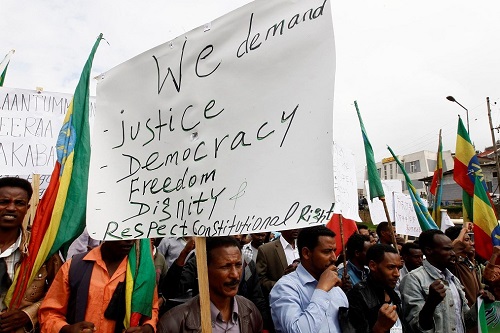Reuters photo
By
Alem Hailu G/Kristos
If a kettle full of water is boiled beyond the limit, it will undoubtedly explode spreading a scalding water in every which direction.
By the same token, stifling people’s voices and concerns ultimately gives rise to uprisings. If cornered, fighting back, a prey could turn a predator. That was exactly what happened in Ethiopia in recent years.
Before reforming itself, the government that opted to distance itself from the public to the degree of arrogance was politically suppressing people. Covertly or overtly, creating a hotbed for a rent seeking mind bent, it was also tacitly exercising economic subjugation.
The political system and the economic structure did not take on board youths to say nothing about other segments of society. It was such youths, pushed to the peripheries, that fueled the political wildfire that rippled across the nation and which brought the arrogant and unaccountable to their knees.
Development was not also rippling to the grassroots ever widening the gap between people and government.
The conflation of the aforementioned challenges that put an unbearable strain on citizens gave rise to a clamor for change.
The clamor sought an outlet via Facebook and opposition parties. Salient among the complaints voiced by the people were “The government is duty bound to listen to the heart beat of citizens,” and “We need government officials that minister to the demands of the people not those that by unfair means line up their pockets at the cost of harm to citizens counted in millions.” It was this tragic episode that obligated the reform Ethiopia is undergoing these days. In an unprecedented way, the reform has hit the zenith in the political history of the country.
As an aftermath of the divide and rule and maladministration issues that rocked the country, wranglings among citizens pertaining to the nature of the flag and ethnic federalism are still conspicuous.
Also since the government-owned media were made to buckle under censorship they were merely wagging tails to the chagrin of the majority. The private run ones were emasculated by strict rules. The fate of civic societies was no different.
No need to mention economic reform presupposes political reform. After the reform that showed a green light to freedom of expression people’s interest to engage in political debates has picked up steam. This disposition has to be encouraged as there are numerous issues which presuppose deliberations. Forums for discussions and deliberations on burning or key political agendas that involve the elite have to be promoted. It sure is good that public lectures are organized, especially universities that display ethnic mix and as such mirror Ethiopia in a petty model could take the leading role. Universities must not be quarters of ethnicity-charged politics but centers of brainstorming that shape the mindset of nearby communities. Giving coverage to such events the unchained media must play its due role.
Strengthening democratic institutions will give a kiss of life to the democratization process underway. The task is exigent as the nation is readying itself for a national election to be held soon.
Social media activists have to use Facebook for good ends such us upholding democracy, ensuring peace and fast tracking development rather than fomenting to dos blowing things out of proportion and dishing out stories that make citizens go for each other’s necks.
All media outlets must lend force to the current reform underway. Commendable changes are taking shape. Capable members of the fair sex who for long had been accorded a cold shoulder are gracing the administrative ladder. Women who handle nature tasked extra works prove trustworthy too. Aside from fulfilling one of the Sustainable Development Goals (SDGs) their coming to power helps reinforce the fight against corruption.
Towards the furtherance of the fruits of reform, the government and the general public have to work hand in glove.
Alem Hailu G/Kristos
A published poet, novelist, editor, translator of masterpieces, literary critic, playwright and journalist from Ethiopia. M.A holder in literature, Addis Ababa University.
Looking for a traditional publisher of a collection of poems. My novel: ‘Hope from the debris of hopelessness’.



No Comments Yet!
You can be first to comment this post!